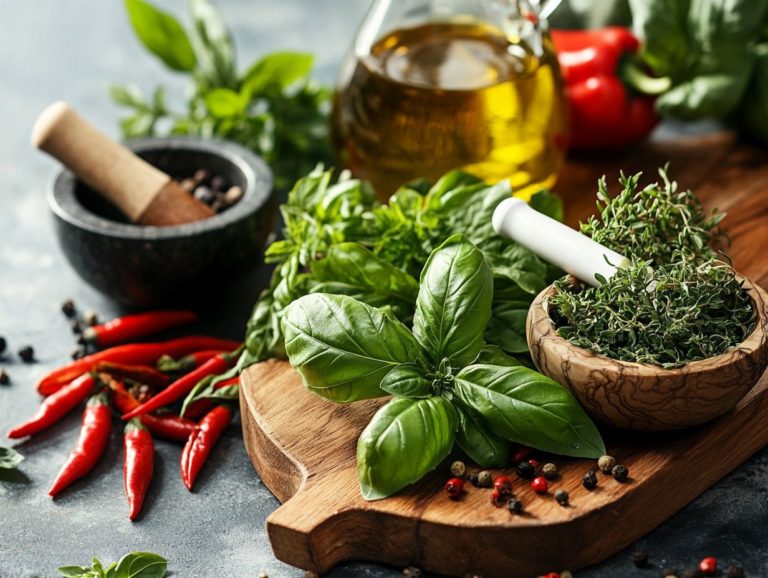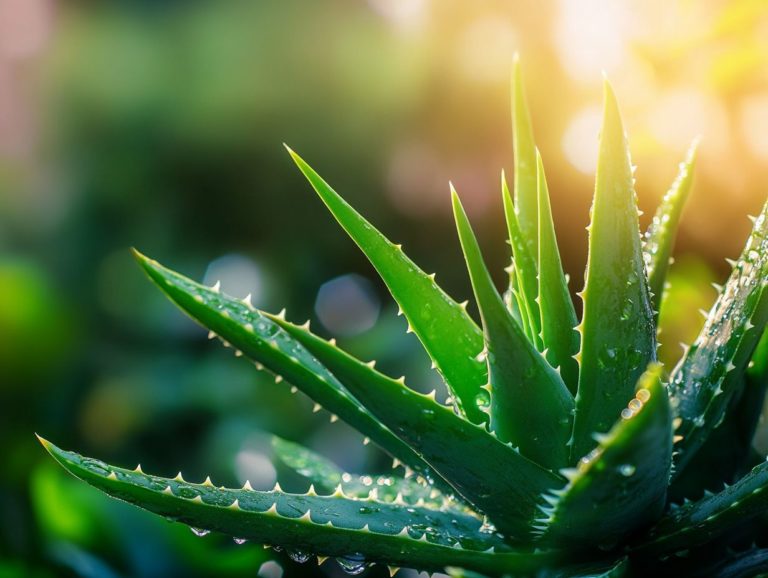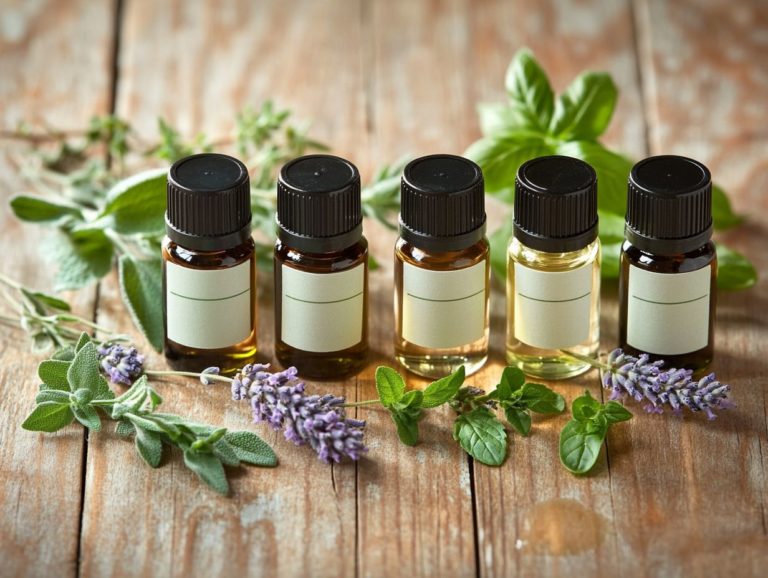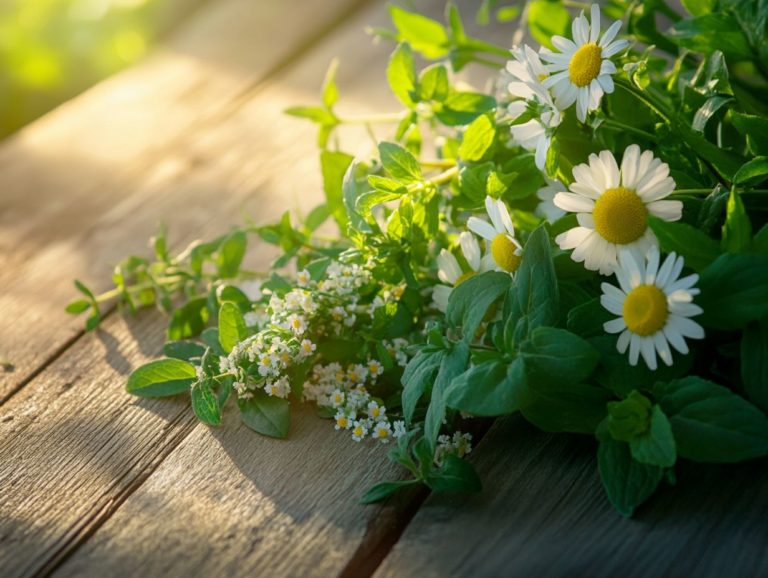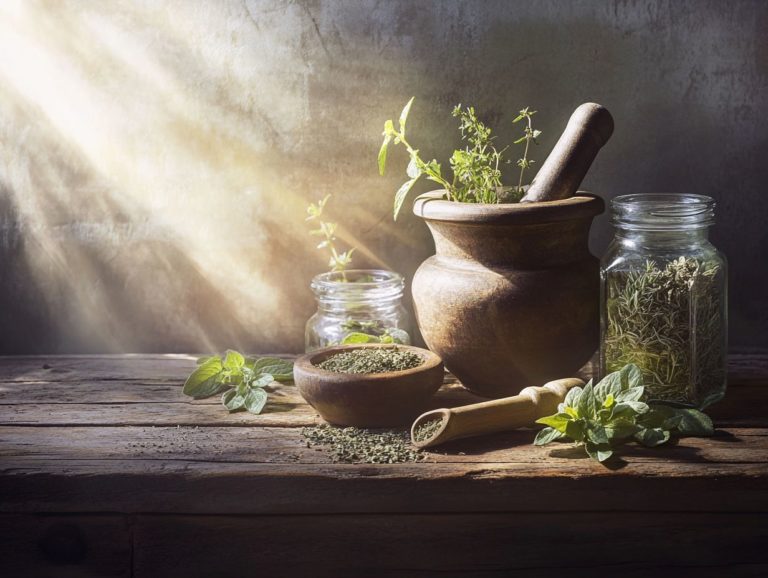5 Herbal Remedies for Cold Sores
Cold sores can serve as an unwelcome and painful reminder of the body s vulnerability to viruses. However, nature offers a selection of herbal remedies that may help soothe and even prevent these outbreaks.
Get ready to explore five powerful remedies that can change how you manage cold sores! This article will cover lemon balm, tea tree oil, licorice root, aloe vera gel, and echinacea. We’ll also delve into what cold sores are, their causes, how these remedies function, potential side effects, and other natural alternatives.
Contents
Key Takeaways:
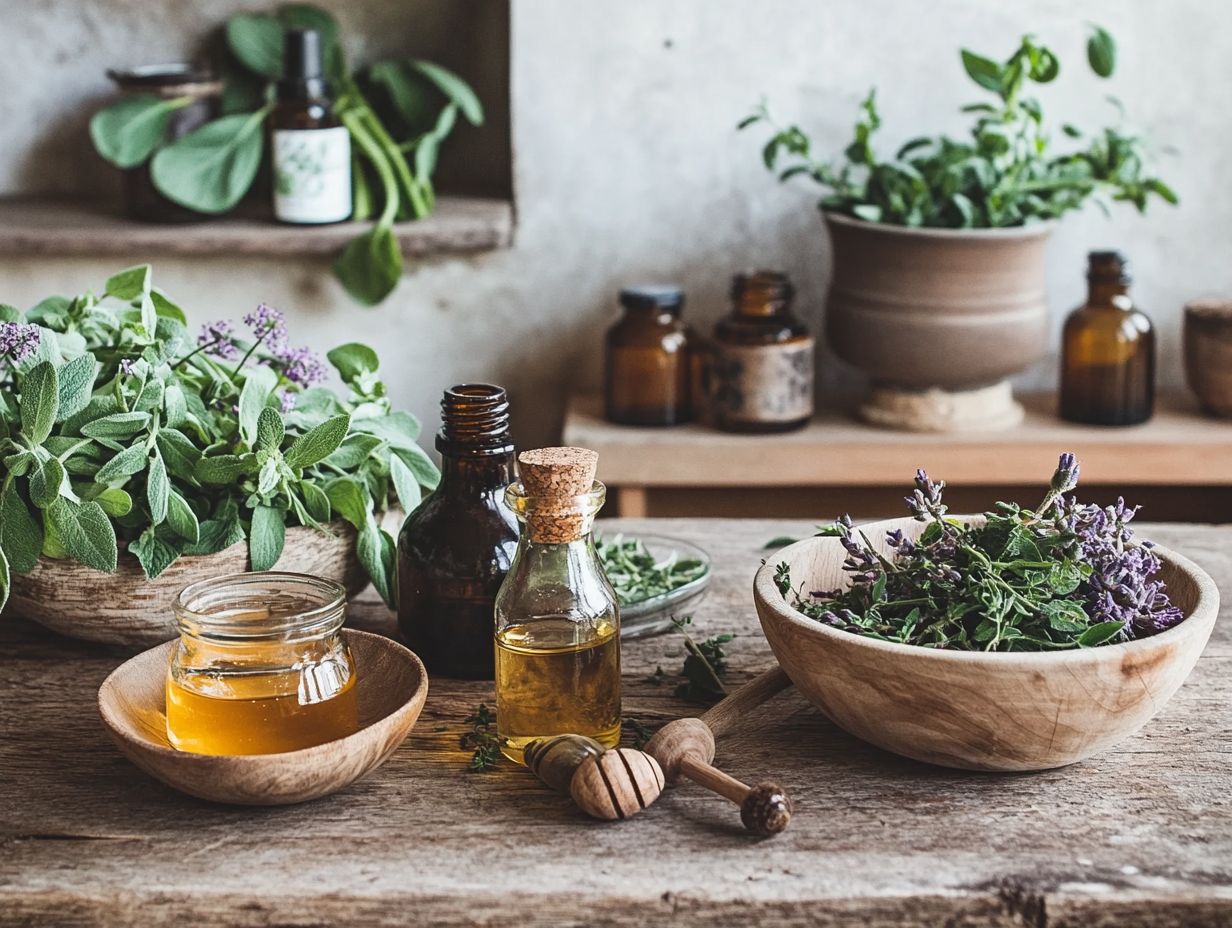
- Use lemon balm to reduce the severity and duration of cold sores thanks to its ability to fight viruses.
- Apply tea tree oil to heal cold sores and prevent infection, harnessing its antiseptic and anti-inflammatory properties.
- Take advantage of licorice root, which contains a natural compound that helps fight viruses to reduce the frequency of cold sore outbreaks.
1. Lemon Balm
Lemon balm, a remarkable herb celebrated for its ability to fight viruses, stands as a powerful ally in treating cold sores caused by the herpes simplex virus. It offers effective pain relief while promoting the healing process.
Research reveals that specific compounds within lemon balm, like rosmarinic acid and citral, exhibit significant antiviral activities. These compounds may impede the virus’s ability to replicate. When you opt for topical creams or infused essential oils featuring this herb, you can conveniently apply it directly to the affected areas, enhancing its effectiveness.
Numerous clinical studies support the notion that using lemon balm products not only alleviates symptoms but also accelerates healing time. Many individuals have reported substantial improvements in their cold sore outbreaks after consistent use.
2. Tea Tree Oil
Tea tree oil is renowned for its natural ability to fight viruses and bacteria, making it an excellent choice for managing cold sores and accelerating the healing process.
Derived from the leaves of the Melaleuca alternifolia tree, this potent essential oil has been treasured for centuries, especially by Australian indigenous communities, for its multitude of therapeutic benefits. Its unique composition enables it to penetrate the skin effectively, targeting the herpes simplex virus that causes cold sores.
The antiseptic qualities of tea tree oil not only ward off infections but also foster skin healing, alleviating discomfort and minimizing scarring. For optimal results, dilute the oil with carrier oils, like coconut or jojoba oil, to enhance absorption and reduce any potential irritation. Simply apply it directly to the affected areas several times a day for the best effects.
3. Licorice Root
Licorice root is a remarkable herbal remedy that has been traditionally revered for its ability to combat cold sores linked to herpes simplex, thanks to its powerful antiviral properties and symptom-relieving effects.
The root is rich in active compounds, particularly glycyrrhizin, which is thought to inhibit the virus’s replication. This support assists your body s natural healing processes. Using the extract topically allows for direct application to affected areas, providing targeted relief and potentially reducing the duration of flare-ups.
Additionally, licorice root boasts anti-inflammatory properties that may help diminish swelling and redness, offering a soothing touch that fosters comfort. By incorporating licorice root into your skincare routine, you can leverage these benefits while bolstering your skin s resilience during outbreaks.
Try these remedies today and take control of your cold sore outbreaks!
4. Aloe Vera Gel
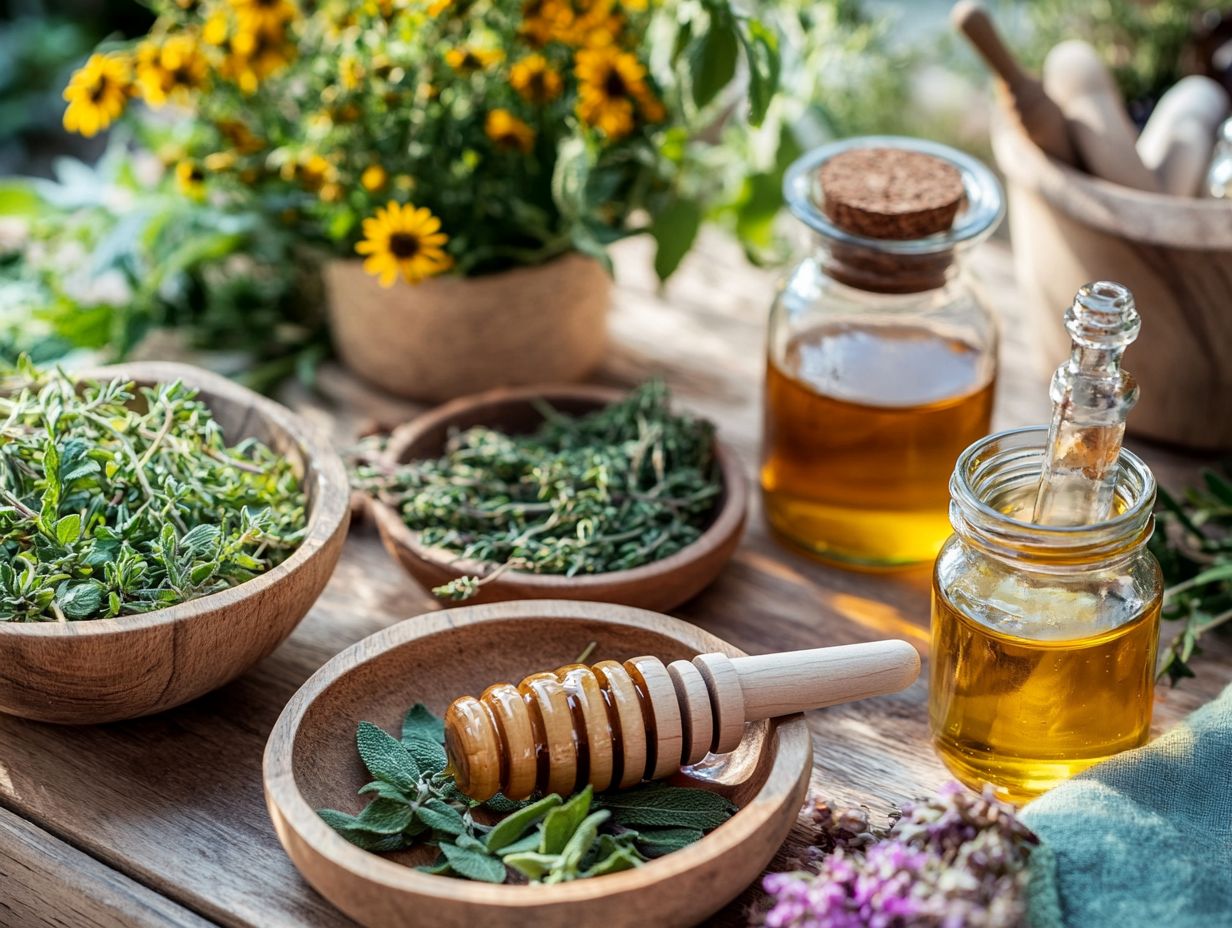
Aloe vera gel is highly regarded for its soothing benefits and is often your go-to for treating cold sores, providing both pain relief and aiding in the skin’s healing process.
This remarkable plant brings a wealth of benefits for various skin issues. Its powerful anti-inflammatory and moisturizing qualities make it effective.
When you apply aloe vera to irritated or inflamed skin, you can effectively reduce redness and swelling, making it an ideal remedy for conditions like acne, eczema, and psoriasis.
Its natural ability to lock in moisture not only hydrates your skin but also helps restore its protective barrier, enhancing overall skin health. With regular use, you can achieve smoother, more resilient skin, minimizing symptoms while promoting a radiant complexion.
5. Echinacea
Echinacea, renowned for its immune-boosting prowess, could be your ally in preventing and managing cold sores triggered by the herpes simplex virus.
Research shows this herb boosts your immune response. Its natural compounds (like sugars and plant nutrients) work in harmony to enhance the function of white blood cells your essential warriors against viral intrusions.
You can easily find echinacea in teas, tinctures, or capsules! Choose what fits your routine best. For optimal benefits, many experts suggest a daily dosage of 300 to 500 mg of dried echinacea extract, ideally taken in split doses throughout the day.
Consistent intake might not only help alleviate cold sore symptoms but also serve as a proactive strategy during those seasons when outbreaks are more likely to occur.
What Are Cold Sores and What Causes Them?
Cold sores, often referred to as fever blisters, are those pesky, painful little lesions that tend to pop up around your lips. They re primarily caused by the herpes simplex virus (HSV-1 or HSV-2) and can be triggered by various factors, like skin contact, stress, or even illness.
These outbreaks can be quite uncomfortable and often catch you off guard, leaving you scrambling for effective ways to manage them. The herpes simplex virus spreads easily through direct skin contact, making it a sneaky culprit during close interactions, such as kissing or sharing utensils.
You might notice symptoms like tingling or itching sensations right before the blisters show up, followed by weeping and eventual crusting over. Hormonal changes, fatigue, and even a bit of sun exposure can act as catalysts for these unwelcome outbreaks.
To keep cold sores at bay, establish a solid skincare routine and avoid known triggers now! Consider employing antiviral treatments. This proactive approach can make a world of difference in minimizing recurrence.
How Do These Herbal Remedies Work to Treat Cold Sores?
Herbal remedies such as lemon balm, tea tree oil, licorice root, aloe vera, and echinacea work in harmony to treat cold sores, enhancing the healing process, alleviating symptoms, and exhibiting antiviral effects against the herpes simplex virus. Additionally, 5 herbal remedies for headaches can also provide relief and support overall wellness.
Each of these agents has undergone scrutiny for its distinct properties and potential benefits. For example, lemon balm has demonstrated promise in clinical trials for shortening the duration of cold sores, with evidence suggesting that topical application can significantly reduce healing time. Tea tree oil, celebrated for its antiseptic qualities, possesses similar antiviral properties that may help stave off outbreaks.
Experts point out that licorice root, rich in glycyrrhizin, can inhibit viral replication, which may diminish flare-ups. Aloe vera is revered for its soothing effects and hydration, both of which support recovery of affected skin. When combined, these remedies offer a holistic approach, tapping into nature’s potential to bolster the immune system and promote swifter healing.
What Are the Potential Side Effects of Using Herbal Remedies for Cold Sores?
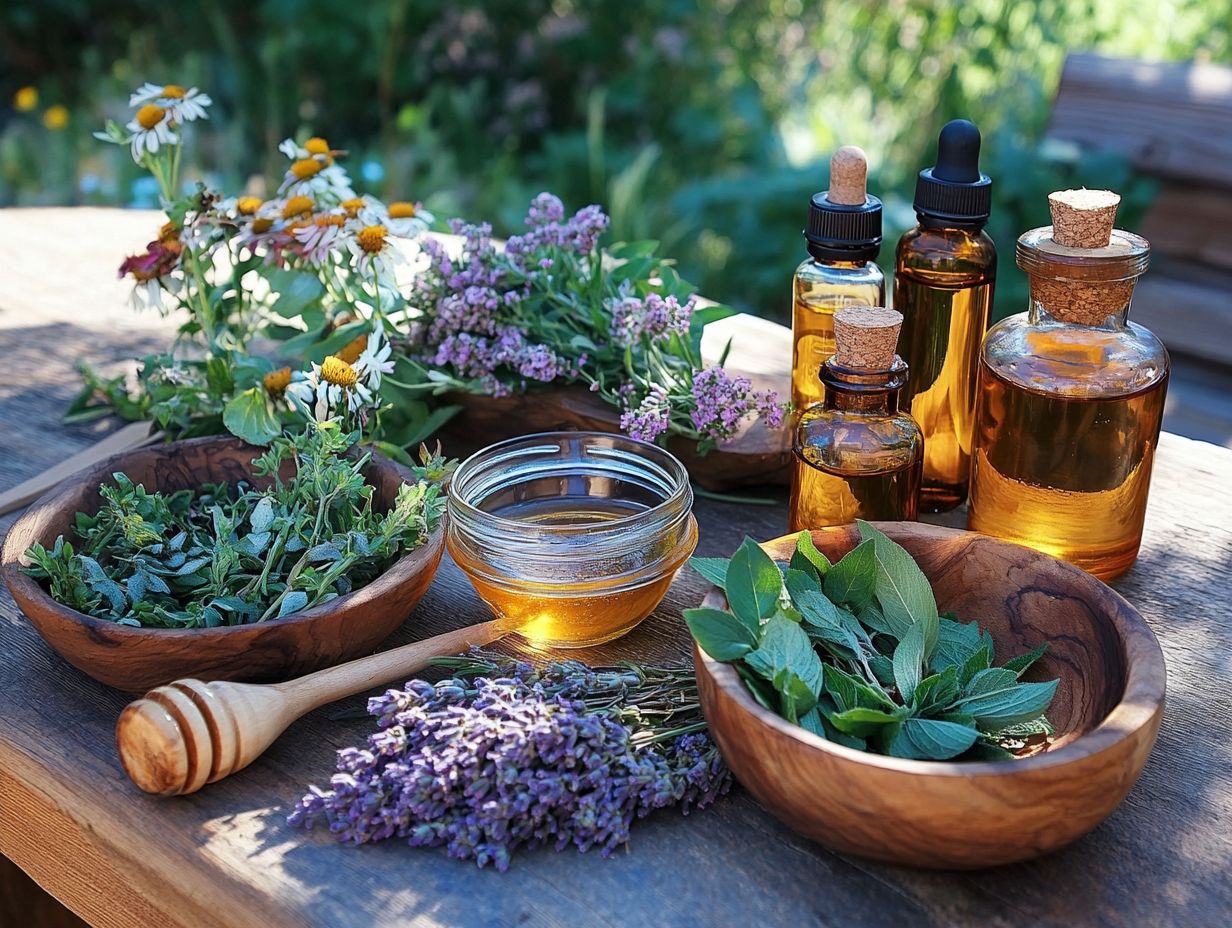
Herbal remedies for cold sores can be effective. However, they may cause side effects like skin irritation or allergic reactions. This is particularly true when using concentrated forms such as topical creams or essential oils.
Take tea tree oil, for example. It has the ability to fight germs, but it may occasionally cause a burning sensation or redness, especially in individuals with sensitive skin. Lemon balm might lead to mild irritation for some users. It’s vital to understand that everyone reacts differently to herbal treatments, so stay informed about these possible reactions.
To minimize risks, consider performing a patch test before applying any remedy fully. Consulting with a healthcare provider can provide valuable insights tailored to your specific health needs and help you navigate any potential interactions with other medications.
Are There Any Other Natural Remedies for Cold Sores?
In addition to herbal remedies, various natural alternatives such as zinc and lysine supplements show promise for both the prevention and treatment of cold sores. These supplements provide essential nutrients that can aid in pain relief and facilitate healing.
Zinc is particularly vital for the body’s defense system and skin health. When taken in adequate amounts typically around 15-30 mg per day for adults it can help reduce the frequency of outbreaks. Lysine, an amino acid, is often recommended at a dosage of 1000-3000 mg daily to inhibit the replication of the herpes simplex virus.
You might also explore natural options like propolis, a resin from bee hives known for its antiviral properties, or specific essential oils such as tea tree or lavender. Each of these can contribute positively to healing and soothe irritated skin. By incorporating these remedies, you not only seek relief but also enhance your overall well-being during flare-ups.
Can These Herbal Remedies Be Used for Prevention of Cold Sores?
You can effectively utilize various herbal remedies, such as lysine supplements and echinacea, as preventive measures against cold sores. These remedies enhance immune support and help reduce the frequency of outbreaks.
Incorporating these remedies into your daily regimen may lead to significant improvements in your overall immunity, empowering your body to combat the virus more effectively.
Making lifestyle changes like maintaining a balanced diet rich in antioxidants, staying properly hydrated, and managing stress through mindfulness practices can greatly complement your efforts.
Regular exercise is also essential, as it promotes circulation and boosts your body s natural defenses. By embracing a holistic approach that combines herbal aids with healthy habits, you can further lower your risk of experiencing cold sore episodes and enhance your overall well-being.
Frequently Asked Questions
What are some natural remedies for cold sores?
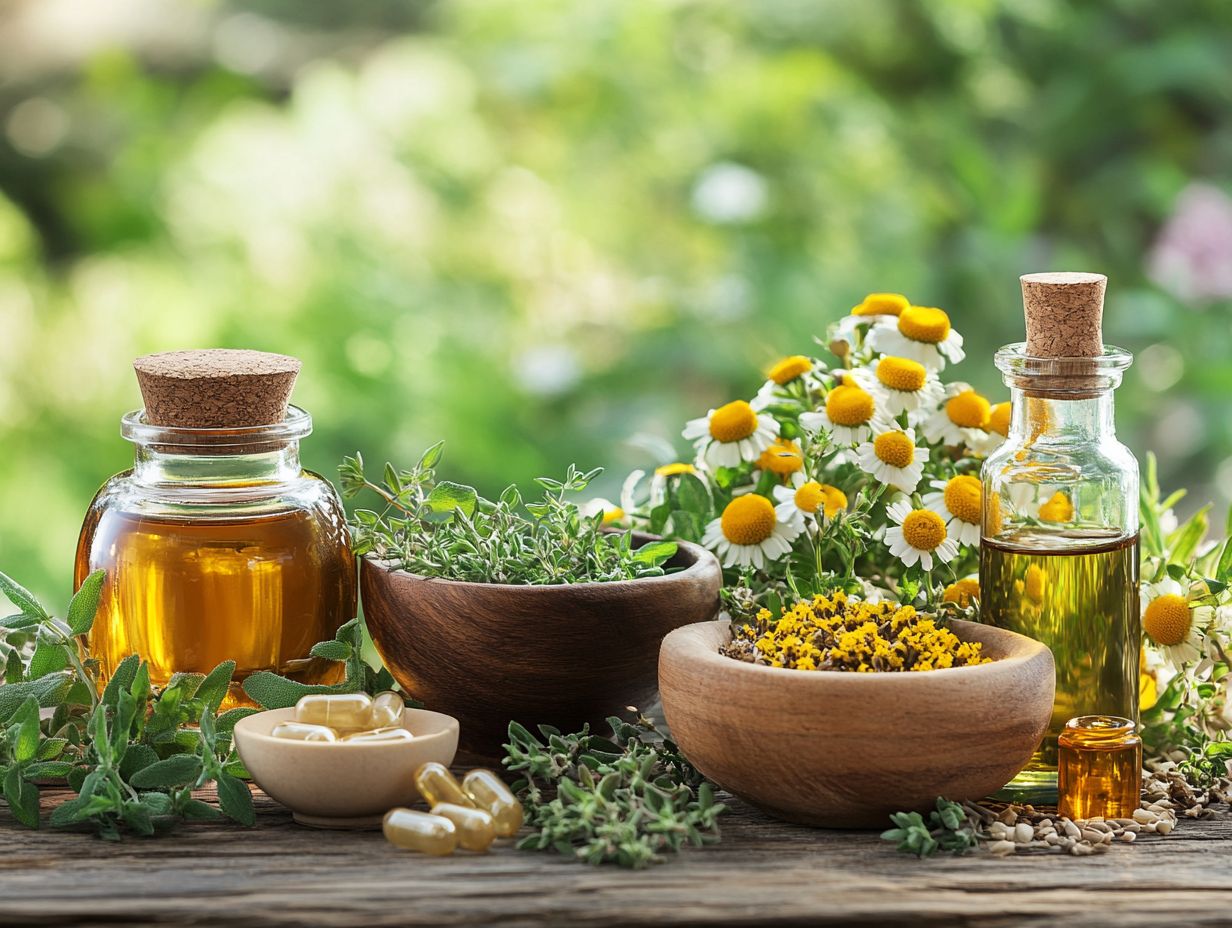
Some natural remedies for cold sores include herbal options like lemon balm, licorice root, tea tree oil, echinacea, and aloe vera gel.
How does lemon balm help with cold sores?
Lemon balm fights the herpes simplex virus thanks to its antiviral properties. It also has anti-inflammatory properties that can reduce redness and swelling.
Can licorice root be used for cold sores?
Yes, licorice root has been traditionally used to treat cold sores, known for its antiviral and anti-inflammatory properties. You can apply a licorice root extract or cream directly onto the cold sore.
Is tea tree oil effective for treating cold sores?
Yes, tea tree oil has antiviral properties that can help fight against the herpes simplex virus. Its anti-inflammatory properties can also help reduce pain and swelling associated with cold sores.
How can echinacea help with cold sores?
Echinacea boosts your immune system, helping your body fight the herpes simplex virus responsible for cold sores.
It also helps reduce how often you get outbreaks and shortens their duration. Try echinacea now to combat your cold sores effectively!
Can aloe vera gel be used to treat cold sores?
Yes! Aloe vera gel soothes the pain and discomfort of cold sores.
Its antiviral and anti-inflammatory properties can speed up healing. Give it a try for relief!

